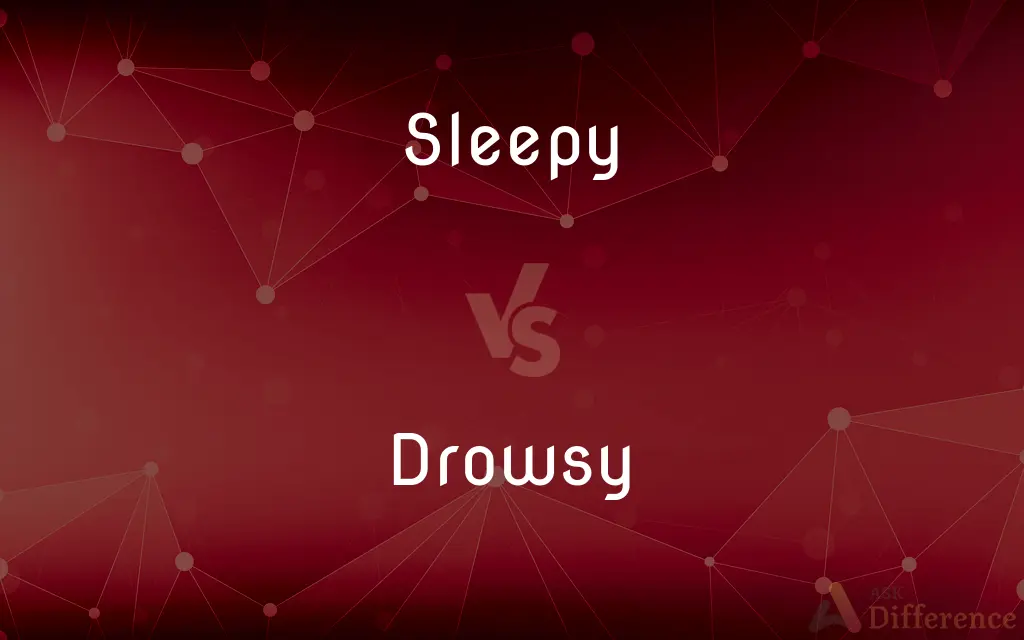Sleepy vs. Drowsy — What's the Difference?
By Fiza Rafique & Maham Liaqat — Updated on April 9, 2024
Sleepy is a state of needing sleep or feeling ready for sleep, while drowsy implies a more lethargic, often medication- or condition-induced state of readiness to fall asleep.

Difference Between Sleepy and Drowsy
Table of Contents
ADVERTISEMENT
Key Differences
Sleepy describes the natural feeling of being ready for sleep, often as a result of the body's normal circadian rhythm or after a period of activity that leads to tiredness. It's a signal from your body that it's time to rest. Whereas drowsy refers to a feeling of being unusually sleepy or a state of impaired alertness, often as a side effect of medication, illness, or a sleep disorder. It can occur at times when you wouldn’t normally be sleeping.
While being sleepy might be resolved by a good night's sleep or a nap, thus aligning with the body's natural need for rest, being drowsy can persist despite sleep. Drowsiness often requires addressing the underlying cause, such as changing medication, treating a medical condition, or adjusting lifestyle habits that disrupt sleep.
Sleepiness can be seen as a cue to prepare for bed, engaging in routines that signal the end of the day. People might feel sleepy at the end of a long day or after physical exertion. On the other hand, drowsiness might not align with the body's natural rhythms and can significantly affect one's ability to perform tasks that require attention, such as driving or working.
The causes of sleepiness are generally natural and include factors like physical activity, lack of sleep, or the time of day. Conversely, drowsiness can be induced by external factors such as medications (e.g., antihistamines, sedatives), alcohol consumption, or medical conditions like sleep apnea.
While sleepiness is considered a normal state that everyone experiences regularly, drowsiness is often a sign that something unusual is affecting the body or brain, indicating that caution or medical attention might be necessary, especially if it occurs frequently or interferes with daily life.
ADVERTISEMENT
Comparison Chart
Definition
Needing sleep, feeling ready for sleep.
Feeling unusually sleepy, lethargic, often due to external factors.
Causes
Natural circadian rhythms, tiredness.
Medications, medical conditions, substance use.
Solution
Sleep or a nap.
Addressing underlying causes, medical consultation.
Impact on Daily Life
Normal part of daily routine.
Can impair ability to perform tasks, may require caution.
Associated With
End of the day, after exertion.
Anytime, often unrelated to natural sleep cycles.
Compare with Definitions
Sleepy
Caused by routine physical activity or lack of sleep.
Missing a night's sleep made me very sleepy the next day.
Drowsy
Feeling unusually sleepy, often as a side effect.
The medication made me drowsy.
Sleepy
Feeling the need for sleep.
After the long hike, I felt incredibly sleepy.
Drowsy
Can occur despite getting enough sleep.
Despite a full night's sleep, I woke up feeling drowsy.
Sleepy
Signals time for rest.
The children get sleepy after their bedtime story.
Drowsy
Requires addressing underlying issues.
Treating my sleep apnea helped reduce my drowsiness.
Sleepy
Resolved by sleeping.
A short nap can leave you feeling less sleepy.
Drowsy
Affects alertness and performance.
Driving while drowsy is dangerous.
Sleepy
A natural state at the end of the day.
By 10 PM, I'm usually sleepy and ready for bed.
Drowsy
Often induced by external factors.
Drinking alcohol can make you drowsy.
Sleepy
Ready for or needing sleep.
Drowsy
Dull with sleepiness; sluggish.
Sleepy
Sluggish from sleep.
Drowsy
Produced or characterized by sleepiness.
Sleepy
Inducing sleep.
Drowsy
Inducing sleepiness; soporific.
Sleepy
Inactive; quiet
A sleepy rural town.
Drowsy
Inclined to drowse; heavy with sleepiness
I was feeling drowsy and so decided to make a cup of coffee to try to wake myself up.
Sleepy
Tired; feeling the need for sleep.
Drowsy
Causing someone to fall sleep or feel sleepy; lulling; soporific.
It was a warm, drowsy summer afternoon.
Drowsy medicine
Sleepy
Suggesting tiredness.
Drowsy
Boring.
Sleepy
Tending to induce sleep.
A sleepy drink or potion
Drowsy
Dull; stupid. en
Sleepy
(figurative) Dull; lazy.
Drowsy
Disposing to sleep; lulling; soporific.
The drowsy hours, dispensers of all good.
Sleepy
(figurative) Quiet; without bustle or activity.
A sleepy English village
Drowsy
Dull; stupid.
Sleepy
(informal) The gum that builds up in the eye; sleep, gound.
Drowsy
Half asleep;
Made drowsy by the long ride
It seemed a pity to disturb the drowsing (or dozing) professor
A tired dozy child
The nodding (or napping) grandmother in her rocking chair
Sleepy
Drowsy; inclined to, or overcome by, sleep.
She waked her sleepy crew.
Drowsy
Showing lack of attention or boredom;
The yawning congregation
Sleepy
Tending to induce sleep; soporiferous; somniferous; as, a sleepy drink or potion.
Sleepy
Dull; lazy; heavy; sluggish.
'Tis not sleepy business;But must be looked to speedily and strongly.
Sleepy
Characterized by an absence of watchfulness; as, sleepy security.
Sleepy
Ready to fall asleep;
Beginning to feel sleepy
A sleepy-eyed child with drooping eyelids
Sleepyheaded students
Common Curiosities
What is the main difference between feeling sleepy and drowsy?
Sleepiness is a natural need for sleep, while drowsiness is an impaired state often caused by external factors.
Can drowsiness be a sign of a health issue?
Yes, persistent drowsiness, especially when unrelated to sleep patterns, may indicate a health problem.
How can I combat drowsiness during the day?
Addressing the underlying cause, such as medication side effects or sleep disorders, is crucial. Short-term, caffeine or a brief nap may help, but consult a doctor for persistent issues.
Is it safe to drive when feeling drowsy?
No, drowsiness can impair reaction time and alertness, making it unsafe to drive.
Does being sleepy mean I am not getting enough sleep?
Not necessarily; feeling sleepy can simply be a sign that it is your usual bedtime or after you’ve been active. It becomes a concern if you feel excessively sleepy despite adequate sleep.
Is there a difference in how sleepiness and drowsiness affect my daily activities?
Yes, while sleepiness is a normal part of the day's end, drowsiness can impair your ability to perform daily tasks safely and effectively.
Why do some medications make me drowsy?
Certain medications affect the central nervous system or have sedative properties, leading to drowsiness.
Can lifestyle changes reduce drowsiness?
Yes, regular sleep schedules, reducing alcohol and caffeine intake, and managing stress can help reduce drowsiness.
What should I do if I feel drowsy all the time?
Consult a healthcare provider to identify and treat any underlying conditions or medication side effects.
What role does hydration play in feeling sleepy or drowsy?
Dehydration can contribute to feeling tired or drowsy; staying hydrated can help maintain alertness.
Can both sleepiness and drowsiness be symptoms of sleep disorders?
Yes, both can be symptoms of sleep disorders, though drowsiness is more likely to indicate a disorder if it occurs frequently and without apparent cause.
Is it normal to feel drowsy after eating?
Yes, feeling drowsy after eating, especially a large meal, is common due to the body's energy directed towards digestion.
How can I tell if my drowsiness is due to a medication?
Review the side effects of your medications or consult with a healthcare provider, especially if the drowsiness corresponds with starting a new medication.
Can both children and adults feel drowsy?
Yes, both children and adults can experience drowsiness, but the causes and implications may differ by age.
Can exercise help with drowsiness?
Yes, regular exercise can improve sleep quality and reduce feelings of drowsiness by promoting more regular sleep patterns.
Share Your Discovery

Previous Comparison
Haunch vs. Hunch
Next Comparison
Outsourcing vs. ProcurementAuthor Spotlight
Written by
Fiza RafiqueFiza Rafique is a skilled content writer at AskDifference.com, where she meticulously refines and enhances written pieces. Drawing from her vast editorial expertise, Fiza ensures clarity, accuracy, and precision in every article. Passionate about language, she continually seeks to elevate the quality of content for readers worldwide.
Co-written by
Maham Liaqat













































